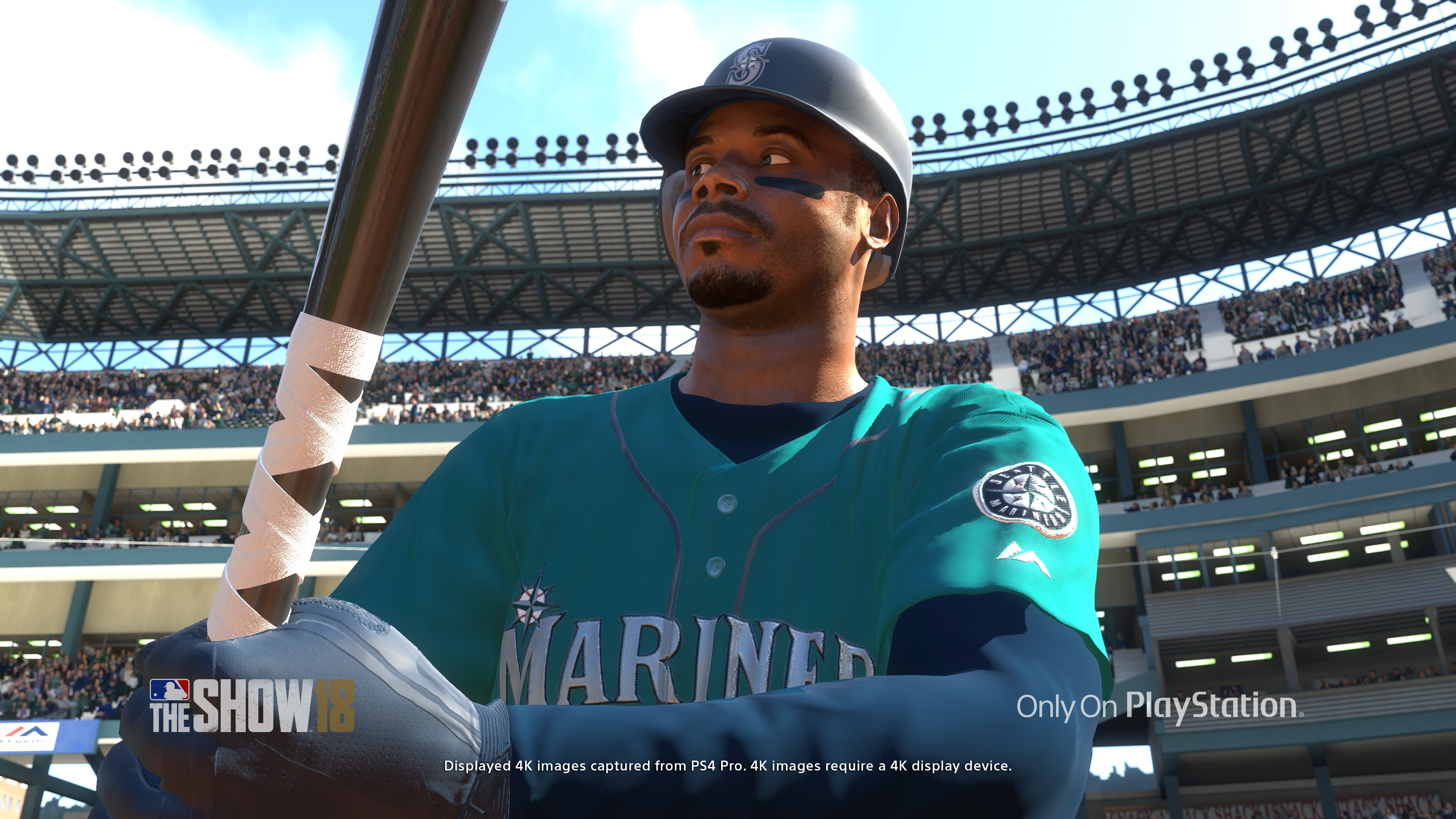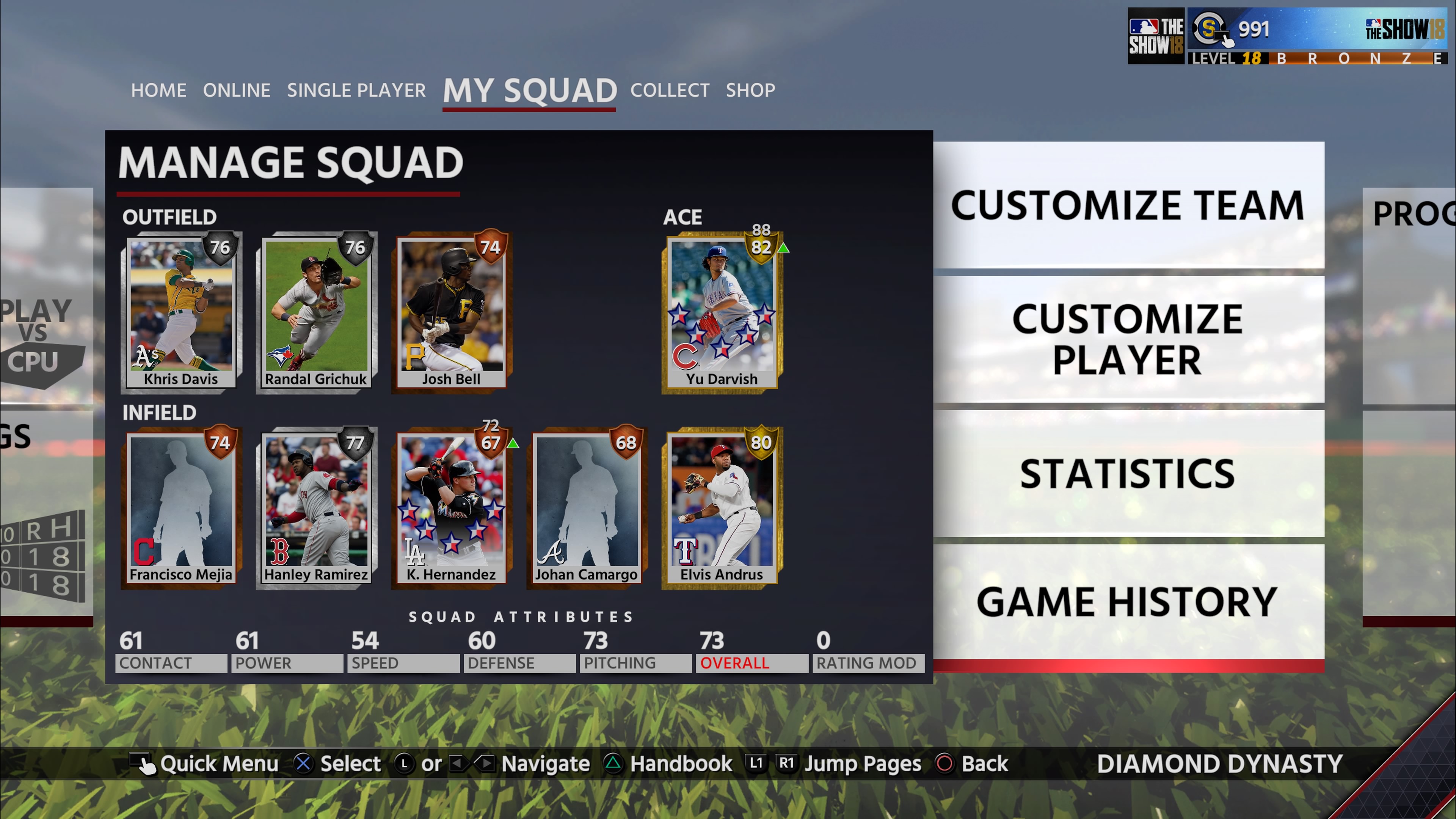“Despite some missteps, MLB The Show 18 remains the best baseball game on the market.”
- Unparalleled hitting and pitching
- Breathtaking visuals
- Solid online infrastructure
- Well-balanced dynamic difficulty
- Missing online franchise mode
- Road to the Show changes can be confusing
If we’re to believe James Earl Jones in the film Field of Dreams, baseball has been the sole constant in the United States since the country was founded. As our world was revolutionized and nearly destroyed, it was our pastime that allowed us to see the soul of America, the game’s simplicity and beauty reflecting our own morality and resolve.
But to claim that baseball hasn’t changed since it was invented in the 19th century is simply not correct. We’ve introduced instant replay in order to get on-field calls correct. Players have grown stronger, capable of launching balls into the stratosphere. Pitchers no longer need to move a muscle in order to intentionally walk a batter. Baseball has evolved with us, and in MLB The Show 18, developer Sony San Diego made its best effort to reflect this. The studio was largely successful, but the game’s changes come at the expense of some sorely missed features.
If you build it…
MLB The Show 18’s basic hitting, pitching, and baserunning gameplay will be familiar to anyone who has played the most recent entries in the series, which is a very good thing. The Show has earned a reputation as the absolute king of baseball games: Its legacy begins and ends with getting the basic mechanics right.
The Show 18 remains a pitcher’s game, giving you the ability to hit targets with pinpoint accuracy and deliver devastating breaking pitches both making it seriously difficult to slap a ball into the outfield. The standard meter-based system allows you to paint the corners, throw a curveball in the dirt, or cause a ground ball with regularity, and it’s just difficult enough to occasionally have you miss the zone completely or serve up a pitch right down the middle. This is more common with pitchers who have thrown close to 100 pitches or have had their confidence hurt after a few bad innings, forcing you to plan ahead with relievers out of the bullpen. Rarely will you see a pitcher able to throw a complete game, but just like in the real show, it’s possible with efficient pitching and a few lucky breaks.
That isn’t to say MLB 18 is unfair – wait for a pitcher to make a mistake, and you’ll find the opportunity to drive a ball into the gap or knock it over the outfield fence. Though Sony touted the game’s new hitting engine in its marketing, we were hard-pressed to notice much difference compared to The Show 17. Patience is rewarded, and with a variety of control schemes making use of the analog sticks and face buttons, anyone willing to put in the time will be able to get the hang of the swing.
Learning to hit won’t magically make you into flawless slugging machine, though. The margin for timing error when at the plate is incredibly small. Hold back just a split-second on a fastball, and it will be in the catcher’s glove before you swing. Pull the trigger too early on a changeup, and you’ll hit nothing but air. After getting several big hits in a row and proving your skill level, the game’s dynamic difficulty system will automatically increase the challenge, dropping it down again if you begin to struggle. It helps to keep the frustrating at the plate to a minimum, as you’ll usually be able to break out of a slump within a few innings.
When you do manage to get wood on the ball after timing a pitch perfectly, you’ll have a chance to see The Show 18’s brilliant ball physics in action.
When you do manage to get wood on the ball, you’ll have a chance to see MLB 18’s brilliant ball physics in action. Balls tail away from fielders and curve around the foul pole when they’re pulled. Line drives that smack off pitchers’ heads will shoot across the infield, setting up tricky bare-handed throws to the bag. “Seeing-eye singles” will occasionally go out of reach of both middle-infielders. None of these occur frequently enough to seem like canned animations, either – not that we’d expect anything less from the series.
Fielding doesn’t feel quite as smooth, though. With three options available to choose from – “automatic,” “assist,” and “manual,” – you have plenty of options for dealing with batted balls, but the default “assist” option feels just a bit too sensitive. After a ball is hit into play, the game will automatically move your fielder a few steps toward the ball before giving you control. (This is standard practice in baseball games). Should you accidentally hit the stick just slightly to the left or right after the wrong time during this animation, though, your fielder will “break the spell,” so to speak, and he’ll forget that he was chasing after a ball at all. It didn’t cause too many missed outs during our time with the game, but lacks the grace found in so many areas of the game’s design.
Stuck in a pickle
The biggest changes in MLB The Show 18 compared to last year’s game can be found in its single-player career mode, “Road to the Show,” which follows a fledgling star on his path to the big leagues. Instead of creating a hall-of-fame caliber player right off the bat, your character must follow a more organic upgrade path to reach achieve superstardom.
Instead of starting with a blank-slate player for you to customize as you see fit, you’ll instead choose one of several pre-made “archetypes.” Each archetype serves as a character creation roadmap, offering a path to grow your player’s potential attributes and abilities in several key areas into likenesses of a current MLB star. You can play with the ferocity of Andre Dawson, or the speed of Kenny Lofton, but those talents comes at the expense of other statistics.

Past iterations of Road to the Show have used a point-based system in order to increase your character’s attributes. Should you make a huge play in the outfield or go three-for-four on the day, you’d be rewarded with points that you could then spend as you saw fit to increase your statistics. Even if your recent success had been at the plate, you could use the points to improve your defense.
This isn’t the case in MLB 18. Instead, your actions on the field directly affect particular statistics, and you’re no longer required (or able) to allot points yourself. The system allows you to naturally improve specific skills — You will get better at hitting if you keep knocking the cover off the ball — but it also limits your ability to improve in areas in which you’re struggling.
In theory, it seems like an interesting, if limiting, idea, but the system isn’t always easy to figure out. The rewards you earn for your on-field achievement don’t always make much sense. Legging out a tiny hit into an unlikely double will increase your power rating, but hitting a ball to the warning track will not. It doesn’t help that your skills only improve based on measurable statistics: Even if you hit screaming line drives in each at-bat, as long as they’re caught, it doesn’t make much of a difference.
Hit-and-run, but don’t stop
When you’re ready to compete against other players, you can head online for one of MLB The Show 18’s several multiplayer modes. Diamond Dynasty, a card-based online mode similar to EA Sports’ Ultimate Team, is back in MLB The Show 18, as well, and it gives you a plethora of options for building up your squad and taking on the world. After choosing an initial 25-man roster, you’re free to compete against the computer, head online for a ranked match, take part in the elimination-based “Battle Royale” mode, or the strategy-like “Conquest” mode.

None of these are new to MLB 18, but the sense of progression you feel without ever needing to spend a penny of real money (though you can) on additional player cards makes it more engaging than other sports games’ core modes. Even if you lose a game, you’ll get enough free cards and currency to continue building up your team, and special challenges related to certain teams and players will allow you to unlock better players fairly quickly. The online talent level has been pretty high since the game’s servers went live, which can be a little discouraging for newcomers, but you’ll notice an immediate increase in your performance after putting a few stars in your lineup.
Most of the MLB The Show series’ other famous modes make a return in MLB The Show 18, including the simple “retro” mode, which uses single-button hitting and pitching as well as a top-down perspective inspired by classic NES games like RBI Baseball. One legacy mode didn’t make the cut: Online franchise mode. Competitive players can still play online in Diamond Dynasty and ranked matches, but you can feel the mode’s absence. It’s particularly disappointing in this year’s game, as online latency is miniscule, making for some of the most enjoyable multiplayer baseball we’ve ever played.
Our Take
MLB The Show 18 makes some missteps this time around, and if you’re most interested in building up a star in Road to the Show, it’s an especially weak year. That said, with fantastic online play and the expected stellar hitting and pitching, it is still an incredibly fun game, and the best baseball simulator coming out this year. We just hope that for next year’s installment, Sony stops to think whether or not it’s really worth changing something for the sake of changing it.
Is there a better alternative?
No. Pound for pound, MLB The Show 18 is the best baseball option for fans planning to play a baseball game this season. That said, if you are specifically looking to play Road to the Show, you may want to stick to last year’s version.
How long will it last?
Given its many different, inherently repeatable modes, you can easily keep playing MLB The Show 18 until next year’s game comes out and fans move on.
Should you buy it?
Yes, despite its flaws. MLB The Show 18 is the best baseball modern experience available right now.







